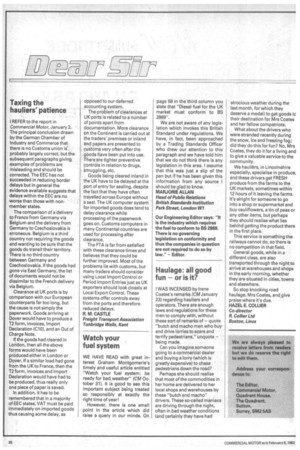Taxing the hauliers' patience
Page 20

If you've noticed an error in this article please click here to report it so we can fix it.
I REFER to the report in Commercial Motor, January 2. The principal conclusion drawn by the German Chamber of Industry and Commerce that there is no Customs union is' probably largely correct, but the subsequent paragraphs giving examples of problems are misleading and should be corrected. The EEC has not succeeded in reducing border delays but in general the evidence available suggests that delays within the EEC are no worse than those with nonmember states.
The comparison of a delivery to France from Germany via Belgium and the delivery from Germany to Czechoslovakia is erroneous. Belgium is a third country not requiring the goods and wanting to be sure that the goods do transit their territory. There is no third country between Germany and Czechoslovakia. If the goods had gone via East Germany, the list of documents would not be dissimilar to the French delivery via Belgium.
Clearance at UK ports is by comparison with our European counterparts far too long, but the cause is not simply the paperwork. Goods arriving at Dover would have to produce a T2 form, invoices, Import Declaration (C10), and an Out of Charge Note.
If the goods had cleared in London, then all the above forms would have been produced either in London or Dover. If a similar load had gone from the UK to France, then the T2 form, invoices and Import Declaration would have had to be produced, thus really only one piece of paper is saved.
In addition, it has to be remembered that in a majority of EEC states, VAT must be paid immediately on imported goods thus causing some delay, as opposed to our deferred accounting system.
The problem of clearances at UK ports is related to a number of points apart from documentation. More clearance on the Continent is carried out at the traders' premises or inland and papers are presented to customs very often after the goods have been put into use. There are tighter preventive controls in relation to drugs, Smuggling, etc.
Goods being cleared inland in the UK have to be delayed at the port of entry for sealing, despite the fact that they have often travelled across Europe without a seal. The UK computer system for imported goods does tend to delay clearance while processing of the paperwork goes on. Customs computers in many Continental countries are used for processing after clearance.
The FTA is far from satisfied with these clearance times and believes that they could be further improved. Most of the problems lie with customs, but many traders should consider using Local Import Control Or Period Import Entries just as UK exporters should look closely at Local Export Control. These systems offer controls away from the ports and therefore reduced delays.
R. M. CASTLE Freight Transport Association Tunbridge Wells, Kent


































































